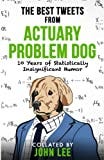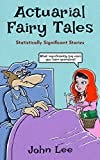Happy Thanksgiving 2022! Deciphering Historical Death and Actuarial Humor Books
Yes, actuarial humor does exist
24 November 2022, 08:16
Happy Thanksgiving!
I’ve got two “fun” items for you today, while you’re either anticipating a feast or recovering from it: historical descriptions of causes of death and actuarial humor books.
Historical descriptions of causes of death: Planet and Wolf
There will be more than just “Planet” and “Wolf” below, but this was popular on Twitter, so you may be interested as well.

I first came across “Planet” as a cause of death when I read Defoe’s Journal of the Plague Year. In the video, I talk about how Defoe used the numbers from the Bills of Mortality (the regular lists from parishes as to number of deaths by cause by week) to indicate there were probably plague deaths being hidden…
…but he gave a complete list at one point in the book, if I remember correctly. “Planet” flummoxed me, but I came across it again later.
This article covers some of the common causes that look mysterious to us now:
Rising of the lights: lights is an old word for lungs, so this is lung disease, perhaps croup.
Teeth: not tooth decay, but an infant who died at an age when they were teething. Most likely they had an infectious disease.
Evil: not a curse, but king’s evil or scrofula, a form of tuberculosis.
Childbed: childbed fever, a microbial infection caught shortly after giving birth, sometimes spread by the infected hands of midwives.
Planet struck: a sudden and severe affliction attributed to astrology.
Overlaid: this means suffocation of a baby by its mother. While this may have been an accident when a sleeping mother rolled over onto her baby, it might also have been deliberate, killing an unwanted child. Infanticide by these means could not be proven.
Suddenly: this could be how a heart attack or stroke was recorded.
Another one people may find of interest is “Wolf” — this was another term for cancer.
Cancer was originally named after the Greek word for crab, given the shape of some tumors. Similarly, “Wolf” comes from the behavior of how the disease would progress, consuming the victim:
Wombs, Worms and Wolves: Constructing Cancer in Early Modern England
In 1714, Daniel Turner, a London physician, published his only work exclusively on diseases of the skin: De Morbis Cutanels. Turner discussed rashes, carbuncles, warts and imposthumes of many varieties, but most striking was his account of an extraordinary story from a ‘villainous Empiric’ who claimed to have cured a woman with a cancerous ulcer:
Such an [tall tale] I was not long since inform’d of, by a Woman who vow’d, that in Time of Dressing, one of these Ulcers, by a villainous Empiric (a famous Cancer Doctor) when they held a Piece of raw Flesh at a Distance from the Sore, the Wolf peeps out, discovering his Head, and gaping to receive it.1
That was a folk tale about a literal wolf coming out from a cancerous tumor, but if you read the text it came from a metaphor as a ravenous wolf would consume prey. Some aggressive cancers do behave that way, after all.
Another cause is “Tympany”, which is not a drum falling on your head, but a gastric bloat where if thump the belly it would ring like a drum. This is a problem with farm animals (we had to deal with this with sheep in 4-H Club).
So while our “hell if we know” cause of death right now is ICD-10 code R99, back then it was “Planet”.
Actuarial humor books
As I remarked in yesterday’s post, there’s an actuarial joke book out….


This is compiled form the tweets of Actuary Problem Dog, and no, you don’t necessarily have to be an actuary to understand (all) the jokes. John Lee, who compiled and edited the book, is raising funds for mental health charities with the book. Link to Amazon US (with my referrer code): The Best Tweets From Actuary Problem Dog: 10 Years of Statistically Insignificant Humor
But wait, there’s more! John Lee also compiled the Ultimate Actuarial Joke Book, which is a little more niche (though I think it would work well as a gag gift this holiday season if you give it to a non-actuary) and he also wrote the Actuarial Fairy Tales book, which I reviewed before:
Here are John’s other two actuarial humor books:
The Ultimate Actuarial Joke Book
Actuarial Fairy Tales: Statistically Significant Stories
Enjoy!
And don’t overeat, or you could die of Tympany!









